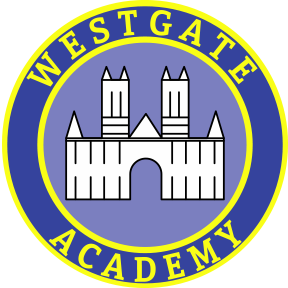Computing Curriculum at Westgate
Computing Curriculum Intent
Through Westgate Academy’s computing curriculum, we strive to ensure that all children leave our school with the confidence, knowledge and skills to be digitally literate, safe and forward thinking in an ever-changing technology-based world. Our computing curriculum is committed to ensuring that children learn and develop their skills through discrete computing lessons and also across all curriculum subjects using an immersive approach. Online Safety forms an essential part of our computing curriculum across all year groups and is important when making sure that children become more immersed in a digital society. We will follow the National Curriculum in a way that meets the needs of our changing cohorts and our individual children.
By the end of Key Stage 2, a Westgate Digital Citizen will be able to…
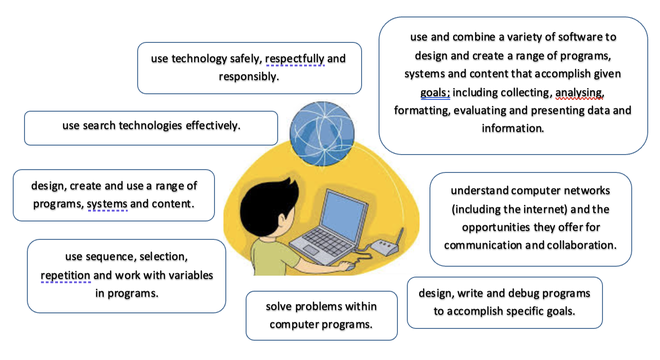
Curriculum Drivers - CLEAR
Communication
- Creating a sense of community/teamwork in lessons.
- Communicating processes and skills.
- Vocabulary focusses ongoing.
- Language exposure, understanding and application which links to all strands of the Computing curriculum including coding, online safety and use of the Microsoft Office software.
- Exposure to social contexts online.
- Understanding what is acceptable and applying the differences of communication in person and online.
- Delivering opportunities for sharing within the school community to showcase what we do as a school. This is through using social media and school website.
Local
- Working alongside local IT experts (InfoTech) who keep us up to date.
- Being part of ‘The National Online Safety Hub’ locally which keeps us up to date with changes/updates and provides us with lesson resources.
- Producing ‘The Westgate Times’ school newspaper.
- Regularly showcasing elements of school on our social media platform and school website.
- Use of webinars to secure knowledge (mainly staff).
- Local expert experience – taught coding lessons.
- Lincolnshire County Council: Stay Safe Partnership work with the school annually to run online safety workshops.
Enriched
- Targeted expert taught coding lessons.
- Safer Internet Day.
- Computing Ambassadors.
- Laptops in classrooms for immersive practice.
- Online Safety sections on school websites are informative and up to date.
- Working alongside parents, including running parental workshops and providing resources.
- Showing respect and responsibility of looking after all the Computing equipment.
- Opportunities to further skills from home (use of Microsoft TEAMS and Office 365).
Ambitious
- Exciting lessons and challenging activities.
- High expectations for outcomes.
- Exposure to daily use of Computing equipment and immersing in all lessons.
- Teaching children to key skills for life-long learning.
- Develops confidence, interest and understanding of the digital world.
- Inspires future careers.
- Computing curriculum accessible for all abilities.
Remembered
- Recapping the Microsoft Office skills annually remembering that these are life-long skills.
- Coding progression across all years.
- Linking Computing to topic/English/Science/PHSE/Maths throughout.
- Using Computing equipment in everyday teaching.
- Use of Computing equipment to aid those with are SEN/PPG.
- Differentiated skill maps.
- Opportunities to further skills from home (use of Microsoft TEAMS and Office 365).
Implementation: Computing Curriculum Content Coverage
|
YEAR GROUP |
WHOLE YEAR COVERAGE AND OBJECTIVES |
|
YEAR 3 |
Online Safety NOS (The National Online Safety) This is to be taught by class teacher/s:
Online Safety should then be linked to in ALL Computing lessons. Units to cover – all with set L.O. and activities:
Completed work evidence to be filed into the children’s individual folders.
Microsoft Office – WORD
Coding
Coding coverage outlined below: |

|
Immersive approach The 3 classroom laptops are to immersed in learning every day. The green screen can be used in lessons (where possible). |
|
|
YEAR 4
|
Online Safety NOS (The National Online Safety) This is to be taught by class teacher/s:
Online Safety should then be linked to in ALL Computing lessons. Units to cover – all with set L.O. and activities:
Completed work evidence to be filed into the children’s individual folders.
Microsoft Office – POWERPOINT
Coding
Coding coverage outlined below: |
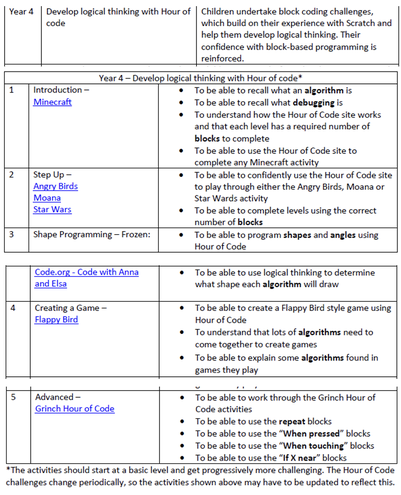
|
Immersive approach The 3 classroom laptops are to immersed in learning every day. The green screen can be used in lessons (where possible).
|
|
|
YEAR 5 |
Online Safety NOS (The National Online Safety) This is to be taught by class teacher/s:
Online Safety should then be linked to in ALL Computing lessons. Units to cover – all with set L.O. and activities:
Completed work evidence to be filed into the children’s individual folders.
Microsoft Office – PUBLISHER
Coding
Coding coverage outlined below: |
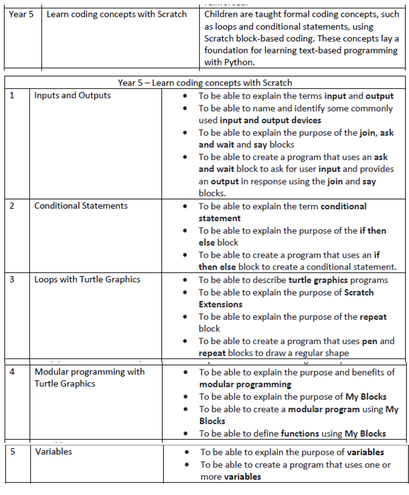
|
Immersive approach The 3 classroom laptops are to immersed in learning every day. The green screen can be used in lessons (where possible).
|
|
|
YEAR 6 |
Online Safety NOS (The National Online Safety) This is to be taught by class teacher/s:
Online Safety should then be linked to in ALL Computing lessons. Units to cover – all with set L.O. and activities:
Completed work evidence to be filed into the children’s individual folders.
Microsoft Office – EXCEL
Coding
Coding coverage outlined below: |
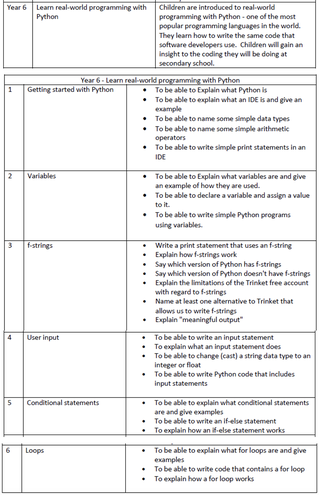
|
Immersive approach The 3 classroom laptops are to immersed in learning every day. The green screen can be used in lessons (where possible). |
Skills/Key subject disciplines
Taken from the National Curriculum for Computing
- Design, write and debug programs that accomplish specific goals, including controlling or simulating physical systems; solve problems by decomposing them into smaller parts.
- Use sequence, selection, and repetition in programs, work with variables and various forms of input and output.
- Use logical reasoning to explain how some simple algorithms work and to detect and correct errors in algorithms and programs
- Understand computer networks including the internet; how they can provide multiple services, such as the world wide web; and the opportunities they offer for communication and collaboration
- Use search technologies effectively, appreciate how results are selected and ranked, and be discerning in evaluating digital content
- Select, use, and combine a variety of software (including internet services) on a range of digital devices to design and create a range of programs, systems and content that accomplish given goals, including collecting, analysing, evaluating and presenting data and information
- Use technology safely, respectfully, and responsibly; recognise acceptable/unacceptable behaviour; identify a range of ways to report concerns about content and contact.
Vocabulary
|
YEAR 3 |
YEAR 4 |
YEAR 5 |
YEAR 6 |
|
Microsoft Word File Insert Design Layout Review View Table Save Save as New Open Cut Copy Paste Type Right click Font Size Bold Italics Underlined Strikethrough Text effects Bullets Numbering Align Spacing Format Text box Margins Orientation Columns
|
Microsoft PowerPoint Presentation Title Subtitle File New Open Save Save as Cut Copy Paste New slide Layout Font Bold Italics Underlined Strikethrough Spacing Bullets Numbering Align Text direction Text box Shape effects Find Template Header Footer Video Audio Design Background Transitions Duration Animations Slide show
|
Microsoft Publisher File New Open Save Save as Cut Copy Paste Right click Font Size Bold Italics Underlined Strikethrough Bullets Numbering Align Spacing Text box Pictures Table Shapes Wrap text Find Format Templates Rotate Insert Page design Review Page Borders Margins Orientation Size Themes Background
|
Microsoft Excel File New Open Save Save as Cut Copy Paste Workbook Right click Font Size Bold Italics Underlined Strikethrough Bullets Numbering Align Orientation Wrap text Merge Cells Insert Delete Auto sum Header Footer Table Pictures Charts Column Page layout Formulas Margins Size Background Gridlines Functions Calculation Data Number Money Percentage
|
|
Coding Vocabulary Progression (through the years 3 – 6) Year 3 Instructions, algorithm, blocks, sprites, background, stage, code, program, process, sound, debugging, motion and speed. Year 4 Algorithm, debugging, blocks, program, shapes, angles, repeat, process, ‘when touching’, ‘when pressed’ and ‘if X near’. Year 5 Program, algorithm, debugging, process, input, output, devices, join, ask, wait, say, conditional statement, ‘if then else’, repeat, modular programming, blocks, functions, and variables. Year 6 Programming, algorithm, debugging, process, print statements, variables, assign, f-string, meaningful output, input statement, cast, code, ‘if-else’ statements and loops. Online Safety Vocabulary Progression (through the years 3 – 6) Identity, online identity, offline identity, interact, content, avatar, copy, modify, alter, stereotype, GIF, meme, emoji, sharing, trusted adult, healthy, unhealthy, motive, search, incorrect, inaccurate, official, judgements, evidence, digital personality, unknown, target, influence, fact, opinion, source, search engine, rank, algorithm, fake news, popularity, URL, age restriction, PEGI rating, social, accept, allow, approve, password, usage rights, permission, app, cyberbullying, data, filter, firewall, gaming, social media, hate, hacker and safety. |
|||
Implementation
|
Year 3 |
Year 4 |
Year 5 |
Year 6 |
|
Term 1 - Online Safety (NOS – 6 weeks) Coding - InfoTech |
Term 1 - Online Safety (NOS – 6 weeks) Coding - InfoTech |
Term 1 - Online Safety (NOS – 6 weeks) Coding - InfoTech |
Term 1 - Online Safety (NOS – 6 weeks) Coding - InfoTech |
|
Microsoft Office: Word |
Microsoft Office: PowerPoint |
Microsoft Office: Publisher |
Microsoft Office: Excel |
- 18 weeks (1 hour per week) of Computing coverage to teach.
- InfoTech will teach 5 weeks (6 weeks for Year 6) for year groups 3, 4 and 5 of coding. Teachers are to immerse themselves in these lessons to develop skills and understanding. This is timetabled below…
- Teachers are to teach ALL Online Safety taught units in Term 1 (1-hour lessons).
- Teachers are to teach at least 6 weeks (1-hour lessons) of their focus Microsoft Office program following the skill maps as planning.
- Each child should have their own copy of the skill map to use as self-assessment (colouring each skill block when they can confidently showcase this skill). Teachers are to teach skills and give opportunity for children to use these throughout a piece of work which can be topic linked. Teachers to complete ‘SHOW ME YOUR SKILLS’ during each lesson to check children’s ability.
- 3 pieces of printed evidence is needed per year and showcased as work evidence in books.
- Teachers to set up their classrooms with a Computing bench where the 3 classroom laptops can be placed with chairs and these laptops are to be immersed in a variety of other curriculum lessons every day.
Laptop usage:
- Lower school will be allocated 2x laptop trolleys (blue and grey) which hold a total of 30 laptops.
- Upper school will be allocated 2x laptop trolleys (purple and orange) which hold a total of 30 laptops.
- Every year group will be allocated 2 and a half days per week when they can have access to the 30x laptops – see below.
- All teachers will need to decide within year groups when their class can have access to the 30x laptops on the given days each week.
- Every classroom will be given 3x laptops which are to be set up in the classroom for use every day. These laptops are also the ones to be used if needed by TAs or Supply teachers.
Lower school timetable:
|
Monday |
Year 3 |
|
Tuesday |
Year 3 am/Year 4 pm (only when InfoTech are not covering the Coding progression) |
|
Wednesday |
Year 4 |
|
Thursday |
Year 3 |
|
Friday |
Year 4 |
Upper school timetable:
|
Monday |
Year 5 |
|
Tuesday |
Year 5 am/Year 6 pm (only when InfoTech are not covering the Coding progression) |
|
Wednesday |
Year 6 |
|
Thursday |
Year 5 |
|
Friday |
Year 6 |
Coding teaching timetable – InfoTech leading:
|
Term 1 |
N/A – Online Safety for all year groups. |
|
Term 2 |
Year 3 |
|
Term 3 |
Year 4 |
|
Term 4 |
Year 5 |
|
Term 5 |
N/A |
|
Term 6 |
Year 6 |
Microsoft Office Program skills to be taught for 6 weeks (1-hour lesson per week) during another term chosen by each year group.
Opportunities to revisit learning
Links within Online Safety: All NOS units link to each other. Every Online Safety unit is covered in all years through the use of different videos and activities. As children move up the school, their online safety knowledge in the 8 key areas will be developed and advance.
Links within Coding: Teachers will be able to look at the ‘Westgate Coding Progression’ document which provides a detailed outline of what is taught in each year group and how each year develops their skills and understanding further.
Links within Microsoft Office Programs (Word, PowerPoint, Publisher and Excel):
Year groups will be able to identify similarities between the software (see skill block mind map planning/assessment document) and children will be encouraged to apply this knowledge as they move up the school.
Local Links
InfoTech will provide support to our staff and children. InfoTech will lead all coding lessons and allow staff to upskill themselves as they immerse themselves in these lessons. InfoTech will continue to provide IT support with any issues that arise.
NOS – The National Online Safety Platform is local to us and keep us up to date with the latest information and trends in regards to Online Safety.
Lincolnshire County Council: Stay Safe Partnership work with our school to educate our pupils in Online Safety. They run workshops within out school annually.
Impact
Our curriculum aims for high achievement and progress for all children irrespective of their backgrounds and starting points.
Quality of Education:
- Westgate Academy’s intended impact is that disadvantages pupils and pupils with SEND acquire the knowledge and cultural capital that they need to succeed for the next stage of their education and in life.
- Westgate Academy’s intended impact regarding pupils’ individual progress is that this is a positive measure, thus proving that students can remember more and are able to do more.
Attitudes and Personal Development:
- Children are confident, resilient, and successful learners; they demonstrate the Westgate values and make the right choices.
- Children demonstrate the Westgate values in their learning and behavior in and around school and within the local community.
- Children show respect to all the computing equipment in school and use this equipment safely, responsibly and respectively.
Monitoring arrangements:
- The subject leader is responsible for the monitoring and evaluation of their subject.
- Computing is monitored at least three times during the academic year.
- Judgements on the impact of the curriculum on pupils is based upon a triangulation of different monitoring and evaluation activities within school:
- Lesson observations
- Learning walks
- Pupil/staff voice discussions
- Deep dives
- Work evidence
Governors:
Governors monitor whether the school is complying with its funding agreement and teaching a “broad and balanced curriculum” which includes the requires subjects, through:
-
- School visits
- Lesson observations
- Learning walks
- Pupil voice discussions
- Meetings with subject leaders
- Work evidence scrutiny
- Deep dives
SLT:
SLT will be involved in, or reported back to about, the monitoring conducted by subject leaders or governors. These monitoring tools help senior leaders assess the impact of the curriculum.
Assessment Procedure:
The Microsoft Office skill mind maps that have been created will be used as a self-assessment tool. At the start of each taught lesson the children will review skills they have learnt and at the end they will be given chance to reflect and self-assess their skill development. The teacher provides vast opportunities for the children to develop and practice these skills. The teacher will also complete mini ‘show me your skills’ activities to make sure that the children are confident with the skills they are being taught. This will be shown through colouring the different skill blocks on the skills map each time they feel confident on that particular skill. These skill maps will be past to the child’s next teacher as they move up the school.
InfoTech will use an online assessment tool to track progress in coding. This will be shared with class teachers.
There will be no formal assessment for the teaching of online safety. Online Safety units will be taught thoroughly in every year group and at the start of every year in September. Online Safety will continue to link to all other computing taught lessons and throughout the school through use of assemblies, awareness days etc…
SMSC
|
COMPUTING |
|
|
Spiritual |
Spiritual Development in Computing
– Units of work focusing on technology and online safety.
|
|
Moral |
Moral Development in Computing
|
|
Social |
Social Development in Computing
|
|
Cultural |
Cultural Development in Computing
|
|
British Values |
We aim to instil British values to all our students in a variety of ways within the Computing curriculum. We strive to ensure that all children leave our school with confidence, knowledge and skills to be digitally literate, safe and forward thinking in an ever-changing technology based world Democracy: Within all lessons students have the opportunity to have their opinions heard among their peers when discussing themes, current issues, and practising skills. Students are encouraged to learn about democracy (including allowing everyone the opportunity to have their voice heard). This is often seen through feedback, peer and self-analysis tasks within lessons and during discussions. We also show democracy within the Computing curriculum by encouraging volunteerism in school by running Online Safety committees and allowing these children to make decisions about the organisation of equipment, the computing curriculum and provide a pupil voice when planning further developments. Rule of Law: A key part of Computing lessons is about teaching students about online safety. In every lesson, students recognise and implement their online safety knowledge. This enables children to understand how to behave in the digital world. Individual Liberty: Within our lessons, students are taught about self-discipline and that to be successful you must work hard. Students are encouraged to involve themselves in opportunities which interest them. Students are taught how to keep themselves safe online and know how to report any concerns. Mutual Respect: Individuals are encouraged to make sensible and informed choices in lessons and to take ownership and leadership for this. This is demonstrated through ensuring the working environment is safe and that equipment is respected. Teachers set high expectations about pupil conduct and through the school values, children are taught to respect each other. The Computing curriculum encourages the children to work collaboratively in pairs, small groups and as a whole class during discussions. Students are supportive to each other as well as being understanding of differences. Tolerance: Students in Computing lessons use of a range of social skills in different contexts, including working and socialising with students from different religious, ethnic and socio-economic backgrounds. They are also taught about respecting students’ different abilities and also the teacher when discussing more intense topics. Throughout our Computing curriculum, children have the opportunity to express themselves in a variety of ways. |
